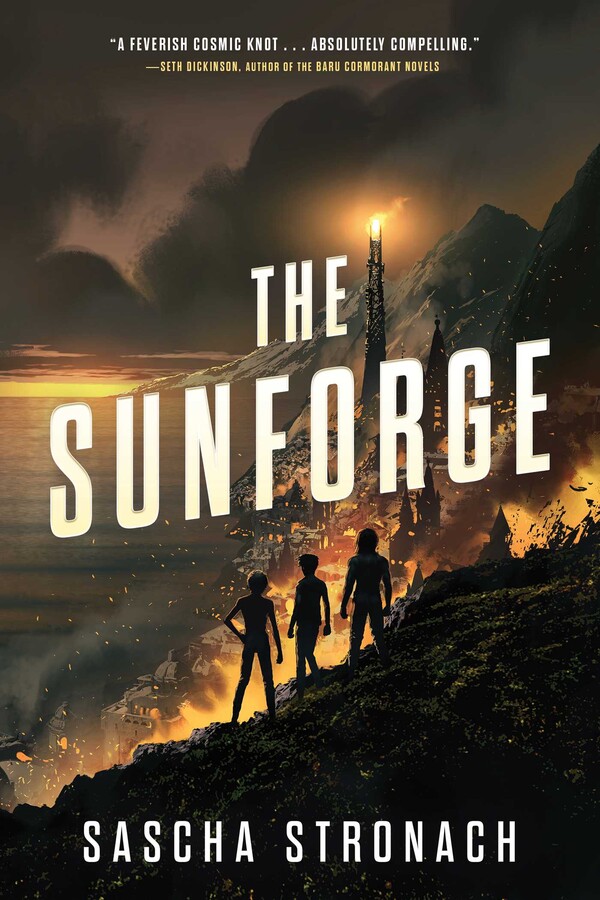The rain came first in spears – fierce long streaks lit silver by moonlight. As the night was pulled further and further apart, the rain went soft, and the wind took it in all directions; fuzzy halos coalesced around the harsh glow of the streetlights. You stood in a hooded oil-coat and pretended not to mind; there was something perverse to electric light — a single light should not have stood against the rain; a single light surrounded on all sides by the sea, when its fire should’ve been quenched in moments. You remembered when there were feeble gas lights, and scurrying link-boys, and when there was only fire, and even before that when darkness squatted upon the face of the earth.
In Vienna, a boy died that night. He was transfixed by the electric streetlight, and did not see the oncoming carriage. It ran him down, and did not slow – he was only a boy. You saw it, from the corner of your eye, and did not intervene. You took his body in your arms. There was no light in his eyes. The rain made his wool coat stink. His eyes were brown, his hair was brown, his skin was pale and bloodless, his neck went the wrong way. He was heavier than you expected.
He stood outside his body, and did not understand: he cried when you took his hand. The children were always hard to deal with, but an eternity steels the soul to a few tears. Still, there was a pang to it–
All men die, but not all children. There is no peace in it – no inevitability. The boy in the wool coat cried when he saw your face, as they all did. You took his cold hand in your own cold hand, and tried to hush him, but it only made him bawl louder. He would’ve been a cooper, like his father. A dying profession, heh.
You felt guilty for laughing but you were human once, and a little of it was still there. You had a name, and a face. In that moment, you had neither. In that moment, you stand sentinel at the gate between the living and dead. The scythe no longer made sense — the farmers used great machines now that could harrow a whole field in a matter of hours. So much for metaphors, but you’d always been always a traditionalist.
You knelt down.
“What is your name, child?” you said.
You knew, of course, but perhaps hearing your voice -like brass nails pounded into wet earth, like the rumble of a mountain before it is taken into the sea- would calm him.
It did not.
“Do you like toys?” you said, and took a wooden horse from inside your coat.
“Neigh,” you said. “Neigh, so goes the horse, as is its way. The horse, like you, is dead. See, it’s not so bad? The nice horse died too. If you come with me, you can have the nice horse. Neigh.”
He did not like the horse. It was, to be fair, not a very good horse. You were the death of people, not of horses — you weren’t familiar with their shape. There had been horses in your life once, but it was so long ago. The toy had too many tails, and too few colours. Anatomical issues aside, with hindsight it was probably not the right animal to show to a child who had just been run down by a carriage.
You snapped off one of its heads.
“See,” you said, “now it has the correct number of those bits.”
Behind you, visible only to the boy and yourself, was the door. The boy had to go through the door. If he stayed, something would come out of the door. That’s why you were there – to ensure the right things went into doors, and nothing came out of them. It was a small door, this time: apposite for a child, difficult for a skeleton who’d been pretty big in life anyway.
The door whispered in the voice of many hungry children. They told the boy to stay. They told him they would let him see his father again, and eat all the candy he ever wanted. Of course they would say that, and of course a child would believe.
The boy bawled.
“Child,” you said, “if you come with me, I will tell you a wonderful jest. You will laugh heartily. We will laugh together, like you once laughed with your father. If you are good, I will return for your father and you can be with him in a nice house forever.”
The boy stopped. Good, mission accomplished.
His eyes were very wide.
“You gon’” he said, “you gon kill my dad?”
“I do not kill anybody,” you said. Your skull gleamed. “I simply collect.”
The subtlety was clearly lost on the boy. He tried to turn, to run. You moved, as you do, between raindrops, and appeared in front of him. You grabbed his wool coat, which stank of wet and blood. The whispers were so loud now, so hungry. You dragged the child’s soul, screaming, towards them. He tried to dig in his toes, but they found no purchase on the wet cobbles.
You threw him through the door. It closed neatly, without ceremony.
You stood alone, in the rain. You lingered for a moment, and considered the broken horse in your hands. The rain came down sideways, in a windtossed almost-mist. You squeezed the horse, and felt its pieces snap, and fall onto the cobbles. For a moment only, you felt sorry.
A lonely wind blew through the streets of Vienna, and you went on your way. There was nothing to see but rain, and the harsh glow of the electric light.

Be First to Comment